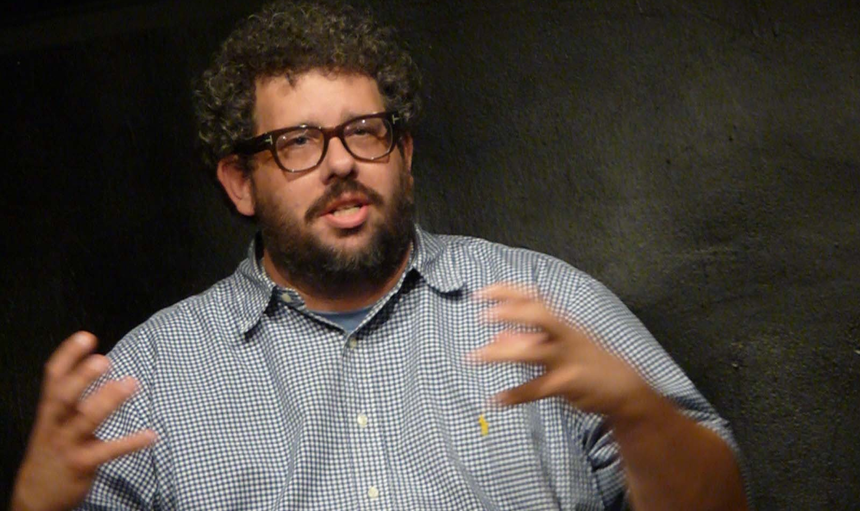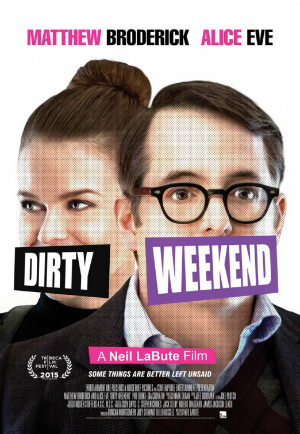Interview: Neil LaBute Talks DIRTY WEEKEND

But much has changed since plays/films like In The Company of Men or The Shape of Things scandalized their audiences. For one, LaBute has accepted the Hollywood challenge of directing other writers' visions, like in Death at a Funeral or the remake of The Wicker Man (to varying degrees of reception). But as LaBute told me over the phone, he's never been one to bend over backwards in search of likeability.

His new film, Dirty Weekend, showcases a new side of LaBute. Fans of his early work will be glad to hear dialogue as biting as in his early films, whereas haters may be relieved to discover LaBute is quite talented at writing characters with heart. Take his latest protagonist, Les Moore, played by Matthew Broderick. Les is on his way to a meeting in Dallas with Natalie, a colleague played by Alice Eve. The film begins when the two professionals are forced to layover in Albuquerque, a city where Les has previously spent a 'dirty weekend'.
A dirty weekend is a British term that refers to a sort of tryst wherein respectable behavior and upstanding character fall victim to lust. But given that Les is indeed an upstanding character, the accidental detour forces him to confront his indiscretion and face his mistakes - or at least find out if 'mistake' is the appropriate word. Given that said weekend was hardly a sober one, Les doesn't know much of anything. But with his prying colleague by his side, like a suppressed Phillip Marlowe, Les is dead set on answers. The result is a hilarious meditation on secrecy, with far more heart than you'd expect from a film about infidelity, not to mention, from Neil LaBute.
ScreenAnarchy: Would you mind walking me through what it looks like when you're writing and it's going well? Is it a momentum thing with your dialogue or do you tend to labour over each line?
Neil LaBute: No. It's definitely a momentum. I'm not someone who's very laborious about the beginning of the process. When I have an idea, I try and shake it for a while. It's like I don't want to start writing. In the beginning I try and go over all the reasons why not to write it. If I can shoot holes through it or if I get bored with it or walk away then I know it's not a really strong reaction I'm having to it. When I find myself in a place where I can't get rid of that idea and I really want to do that more than I want to do anything else, then I know that it's kind of for real. At that point, it's sort of like a relationship. You have these bonds to these things that, in a way, it's like... I just want to be with that thing and I want to sit down and I want to write it.
Where did the inspiration for this film come from?
When I started out writing it, I actually I had imagined that it was going to take place in England. The phrase [dirty weekend] that I'd first heard in England was more used in that country than in our own. That's where I first started working on the script. And then I was not even finished with the script when I was talking to some independent producers who were looking for something, but one of the only considerations they had was that they wanted to work in a state that had a good tax break. Of course lots of people think that way these days.
Then they went through the usual list of Louisiana and Atlanta and all these different places that people are doing that kind of work right now, and New Mexico was one they threw out. So I thought that seemed like a destination that not so many people start out toward, but a great place to have your plane get grounded at, and to have been to previously, and to have been brought back to. I re-figured the world of that film from taking place in London to taking place in Albuquerque. It's a big jump.
The general idea of someone getting stuck in a place that they've never expected really to be back to, and that being the catalyst for this kind of rediscovering something about themselves seemed like something that was there from the very beginning.
What struck you about Albuquerque as a bizarre place to spend a layover?
I thought it presented a kind of great contrast to who these people were supposed to be. The idea that they were from Los Angeles and they were getting off somewhere else, in this case Taos, but ended up stranded in Albuquerque. It's because of its surroundings - it's quite a spread out city. Like a lot of western cities, they don't necessarily grow up but they kind of grow out. Then it's sort of surrounded by desert. All of that, I think, can make you feel quite stranded in a certain way. That, and its particular architecture and topography. All of that to me kind of said this is a great place for someone to end up being stuck.

A lot of your previous films in your filmography sort of deal with nasty characters and now you have Matthew Broderick, who's a fairly sweet man. Can you talk about your choice to deviate from that harsher character you like to write for?
I suppose that there's always that desire to push yourself to do something that's different. In this particular story there really wasn't room for that guy. What I really liked was having two people, in this case a man and a woman, who were not interested in each other in a romantic way or a sexual way. They don't know each other very well, but, by the end, they become more dependent on each other over the course of this trip. I thought, "When you're trying to do something that's a bit lighter, a bit more comedic, you're in search of characters who are a bit little lighter on their feet than some of the people I've written before.
I guess that's what makes this film uniquely accessible, or at least more relatable than some of your other scripts. In what sense are your films personal?
They're not personal in the sense that I don't tend to be a writer who pulls from my past or the past of people around me to create scenarios. You really can't look back in my work, in at least the films that I have written myself and not adapted from a book, or from somebody else, where you made somebody's film or something. You can't look back at those films or plays really and say, "Oh that's about his childhood. This was about his parents. This happened to him when he was in grad school." I don't tend to write that way.
There's got to be some reflection of me in there. It's not that I take my world views and throw them out in a fictional way. I'm a person living in the world and everything that happens to me is going to be filtered through. The funny thing is, it's probably a better question for other people. I rarely look at it and say, "Oh that's me or that's at some part of my life."
Somebody else who knows me might look at it in a different way. I had a situation like that happen early in my life. First thing I did, this film, In the Company of Men, about very white collar business guys. My father was a very blue collar guy and my mother, when she saw that movie said, "Oh you captured your father really well." I thought, "What are you talking about?" She saw it that the spirit of one of those characters was very similar to my father. It's that outsider, perhaps, who sees it better than I do. In a conscious way, I wouldn't say, "Yes. These are very biographical or autobiographical.
How would you say your parents have kind of generally reacted to some of your more squeamish writing throughout your life? Have they always been pretty open to the places you'd like to take your stories?
My father passed away two years ago. He ... I wouldn't say that he was someone who really kept up with my career that closely. My mother likes my work in the way that mothers often do. She's happy that I'm doing what I want to do and she's happy that I'm working. She would prefer it if I would always write comedies, but ... The tougher stuff she kinds of just goes, "Oh goodness!" And tries to move on. It's a pretty expected parental reaction that I've had along the way. They're certainly not my harshest critic.
Speaking of your harshest critics, are there any moments from your career that jump out as some of the most bizarre, aggressive reactions you've gotten? I'm pretty sure your first plays got booed openly. Can you think of some especially memorable moments of being met with just disdain?
Yes. Along the way I've certainly had split reactions to a lot of things. I've probably gotten to a place where I would be more surprised now if there was a kind of general reaction, all positive or all negative. That split seems to be the place that I live. Critically, you kind of just have to go for that ride. You realize that that's part of this journey - that you have this weird career where your work is judged online or in the paper by somebody in a way that other people's work isn't.
It's a very a-typical situation to find yourself in. I have pretty thick skin and tend to read everything and give people latitude and say that's their opinion so they have their right to it, but there have been times along the way where people have, I thought, crossed the line and said really kind of personal stuff. I remember years ago I did a kind of modern retelling of the Medea myth. Someone didn't like the play, but what their review said was, "If only LaBute's mother had done the same." The review said It would've been better if she'd killed me in the womb or not long after.
Once you're in a place where they start to call your mother into it, that's when you kind of to start to take umbrage at it. I remember responding back to that person in a pretty childish way. I'm kind of like, "Maybe we should meet and talk about this". Those kinds of things, I think, are where people go too far, but the rest of it, "Oh, gee, you know what? I didn't like it." That's fair. That's your opinion and there you go, but, yes,I think that I have written enough stuff that people have responded to in both ways that I've had the full range of experiences. I certainly haven't had just a clean ride of it all the way through.
Who would want one?
Somebody might. You know what I mean? Somebody might go and have everybody love them, and then you can't tell where you sit. I think this has been probably a more interesting ride.
The film opens today in select theaters in the U.S.

Do you feel this content is inappropriate or infringes upon your rights? Click here to report it, or see our DMCA policy.






